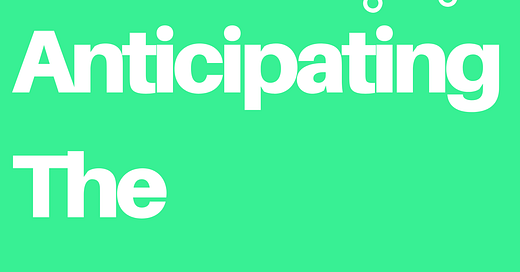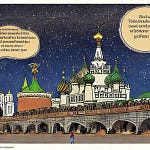Note: Anticipating The Unintended will be on its annual break over the next two weeks. Normal service will resume from Jan 3, 2021
This newsletter is really a public policy thought-letter. While excellent newsletters on specific themes within public policy already exist, this thought-letter is about frameworks, mental models, and key ideas that will hopefully help you think about any public policy problem in imaginative ways. It seeks to answer just one question: how do I think about a particular public policy problem/solution?
Welcome to the mid-week edition in which we write essays on a public policy theme. The usual public policy review comes out on weekends.
PS: If you enjoy listening instead of reading, we have this edition available as an audio narration on all podcasting platforms courtesy the good folks at Ad-Auris. If you have any feedback, please send it to us.
- RSJ
The focus of this newsletter is to make public policy accessible to the public. That’s a claim we often make around here. There are thinktanks and public policy specialists to advise those who are in power. We are at the other end of the pipe. Trying to influence the demand side of the market of democracy. The hope is that an aware and an enlightened public will demand better from their representatives. Once the pattern of demand changes, supply will adjust itself.
The reassuring bit about working at this end of the democratic pipe is the freedom to engage with and critique policies on their merits without tiptoeing our way around giant political or bureaucratic egos. Also, simplifying the language used in policy discourse is fun and enriching. Of course, the difficult part is getting people to listen to you. Not because it is difficult to reach them. Instead as we often realise, the public isn’t interested to know more. They interpret the world around them with limited information available to them and construct an imagined world in their heads. This constructed imagination is the lens through which they view all information they receive. This is what spurs them into political or social actions.
There’s no good answer on who should a public policy newsletter try and influence? The powers that be or the general public?
I realised last week while reading about the Lippman-Dewey debates, this is a century-old question. In the 1920s, the two were engaged in a fascinating duel of ideas and philosophy. While both believed in democracy, one saw it half-empty, the other half-full.
Lippman’s Scepticism About The Ordinary Citizen
Democracy is founded on the belief that public opinion matters. But as the society becomes more advanced, knowledge more specialised and a wider range of issues impact lives, citizens find it difficult to inform themselves about all the issues impacting their lives. The ordinary public can’t be ‘omnicompetent’. This is the problem of knowledge that Lippman probed in his two seminal books – Public Opinion (1922) and The Phantom Public (1925). As Lippman wrote:
"The real environment is altogether too big, too complex, and too fleeting for direct acquaintance.”
The ordinary citizen “lives in a world he cannot see, does not understand and is unable to direct.” This leads to an inevitable discrepancy between “the world outside and the picture in our heads.” This “pseudo environment” in our heads is what we use to form political and public opinions. This is what political parties and media work on to create narratives. For Lippman this was the flaw with the democratic ideal of public participation in decision making. They are coming at it with the “most inadequate picture”.
Lippman though is empathetic to the ordinary citizen’s plight:
“My sympathies are with [the citizen], for I believe that he has been saddled with an impossible task and that he is asked to practice an unattainable ideal. I find it so myself for, although public business is my main interest and I give most of my time to watching it, I cannot find time to do what is expected of me in the theory of democracy.”
Democracy needs competent citizens. If the majority of voters aren’t able to make sense of the real world around them to make clear-headed judgments, what’s the point of it all?
Lippman’s response to this problem was in the role of experts. Representative politics “cannot be worked successfully…..unless there is an independent, expert organization for making the unseen facts intelligible”. An enlightened oligarchy of experts is the answer. In Lippman’s prescription, the expert is a disinterested participant with deep mastery of an area who advises those in power within the government or administration. As Lippman writes:
“The power of the expert depends upon separating himself from those who make the decisions, upon not caring, in his expert self, what decision is made.”
For Lippman this separation of responsibilities is critical for the functioning of the democracy. The role of the ordinary public is restricted in mobilising themselves to elect their representatives on the basis of their performance (real or promised) which in turn depends on how they have used the experts to frame laws and policies. Lippman has no illusions about the capabilities of a popular government that sways to the mood of the public. They need guidance from experts. The citizens neither possess the knowledge or the competence on the wide range of issues that concern their world nor can this be taught to them. Education is a bit overrated and only the optimists see it as a solution. The media and the political parties will continue to construct reality for the citizens that will drive their decision making. The best hope for democracy therefore is to have detached experts who have the ears of those at the helm.
Dewey’s Democratic Faith
The riposte to Lippman came from political philosopher and a champion of public voice in democracy, John Dewey. While Dewey agreed with Lippman’s thesis about an omnicompetent citizen being an illusion, he questioned the need for such special capability. Instead, he argued there are ways in which citizens can acquire sufficient knowledge to participate effectively in a democracy. This to him was a better option than the tyranny of the experts that Lippman favoured.
Dewey viewed knowledge as a kind of social capital that each individual possesses stemming from their participation in the society and from the long history of people gathering knowledge before them. To believe an individual has to know everything about the world around them is to ignore the accumulated knowledge that’s available and which people draw upon in their everyday lives. To him, as he wrote in The Public And Its Problems (1927), this knowledge is built-up through “association and communication; it depends upon tradition, upon tools and methods socially transmitted, developed and sanctioned.”
Dewey gives the example of scientific progress made by humankind as an example of this kind of knowledge. As he wrote:
“The development of tools into machines, the characteristic of the industrial age, was made possible only by taking advantage of science socially accumulated and transmitted.”
And he was convinced this accumulation of knowledge was possible for the political sphere too.
“Just as the specialized mind and knowledge of the past is embodied in implements, utensils, devices and technologies which those of a grade of intelligence which could not produce them can now intelligently use, so it will be when currents of public knowledge blow through social affairs.”
The build up of this social knowledge happens over the years through experts who study this area. So, there is still a role of experts in Dewey’s thesis. However, unlike Lippman, Dewey sees their role is to focus on informing the public, not the experts. The experts must continue to study the complex world around us and the forces that shape them. They must then interpret this for the average citizen who can then act with foresight within their social and political environment. Dewey wrote:
“…inquiry, indeed, is a work which devolves upon experts. But their expertness is not shown in framing and executing policies, but in discovering and making known the facts upon which the former depend.”
For Dewey, the experts must be guided by public spirit and owe their allegiance to the public. They must share their knowledge directly with the public and not restrict it to those in positions of power. The citizen doesn’t need to be omnicompetent; they must know enough through the stock of social knowledge and the guidance of experts to contribute meaningfully to public life.
We are no experts here. But as a public policy newsletter, we side with Dewey in these debates.
HomeWork
Reading and listening recommendations on public policy matters
[Article] A primer on Lippman-Dewey debates: Notes from Carl R. Bybee, 1997, Media, Public Opinion and Governance: Burning Down the Barn to Roast the Pig, Module 10, Unit 56 of the MA in Mass Communications, University of Leicester
[Article] Sean Illing writing in the Vox: Walter Lippmann’s famous critique of democracy revisited.











Share this post